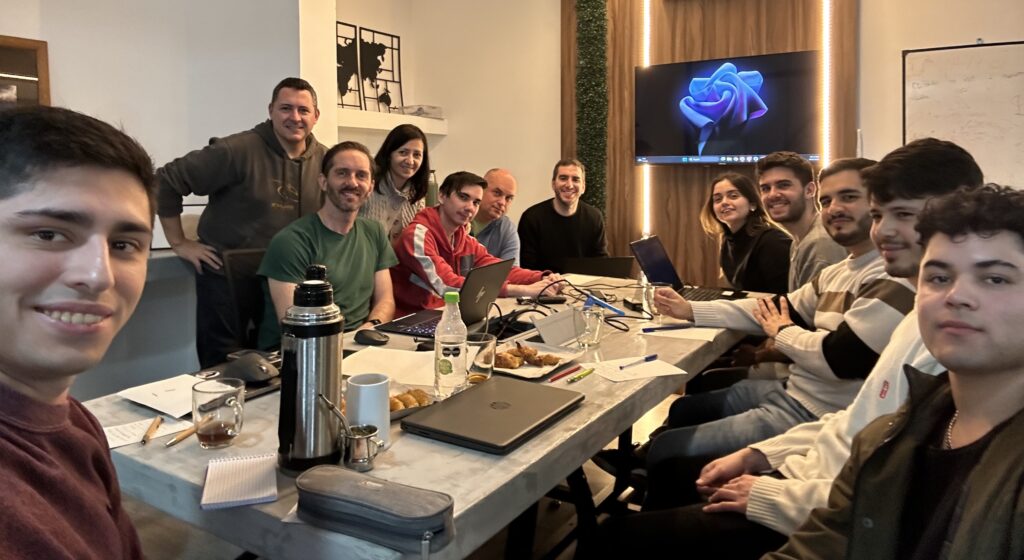B2Gov: Meet the open data bundlers turning binners into winners

Paola Diegues is a self-proclaimed public procurement enthusiast. Her passion for helping others understand government contracting led her to join forces with data scientist Marcelo Blanco and establish B2Gov. Their business facilitates access to procurement information, providing powerful analytics that help companies to search for new opportunities, prepare bids, and evaluate their performance on past tenders.
Since launching their platform in 2020, Diegues and Blanco have built a set of digital tools and data analytics services that have bridged the gap between more than 250 private sector users and public procurement buyers in six countries across Latin America.
They started with a simple idea that is complex to implement in practice. Participating in public contracting represents a massive opportunity for businesses, but one that many fail to seize. According to the World Bank, public contracts account for 15% of global GDP. In OECD member countries, public procurement represents 29% of government expenditure.
The team at B2Gov, based in Argentina and made up of 19 people, offers clients the chance to boost their business capacities in the public procurement market, to understand the competitive dynamics of the market in advance, to conduct performance assessments and devise strategies to succeed in future opportunities. They have solutions focused on each stage of the contracting cycle, while their consulting services advise on public procurement systems, diagnostic and strategic planning, market research, strategic dashboards and regional markets. They currently service 30 clients in Latin America.
The system works by collecting public procurement data and structuring it in the Open Contracting Data Standard (OCDS) format. This allows data and documents at all stages of the contracting cycle to be disclosed according to a common data model. In practical terms, using OCDS data enabled B2Gov to handle data from multiple procurement markets and track procedures from start to finish, including capturing changes to active purchases. In Diegues’ words, data interoperability is the most significant advantage: “regional data interoperability is not possible without the standard.”
Studying the market
In January 2023, after working with public procurement data for a year and a half, B2Gov set out to conduct market studies that would serve to monitor key procurement indicators and prospective government suppliers. “The studies are automated, based on the data, and allow us to see the dynamics of the market over time,” Diegues says.
Market studies are a way for companies to identify suitable buyers and what they are looking for, as well as what competitors are doing (or have done) so far. This allows companies interested in selling their products or services to governments to make informed decisions and understand the business environment they’ll have to deal with throughout.
“Companies waste 80% of their time looking for opportunities. The task is burdensome because there are thousands of public websites and information is not tabulated on many of them,” Diegues says. “So our starting point was providing efficiency to the bidding departments of companies or the people tasked with identifying and preparing tenders.”
Blanco illustrates the challenges of the public procurement market like this: suppose you are a pharmaceutical company selling a specific medication for a specific disease. If you are planning to contract with the government, then you must read through the specifications of the tender, in lists of 100 or 200 lines. If you can’t identify the exact medication you are interested in offering that entity, you may risk wasting valuable resources.
In contrast, B2Gov’s granular search engine allows users to look for precise items. “We intend companies to apply data analysis to answer the question: How much is my
market opportunity worth?,” Diegues says. “Many companies don’t participate in processes because they have no idea they exist and because the risks are high. It is one thing to have a company invest in a team of 10 people because they are after a public opportunity worth 100 million dollars, and another to invest in the same team for a one million dollar opportunity.”
Collection, standardization and systematization
At B2Gov, the data they collect is the main input for their products. Clients are informed about current market dynamics beforehand, so they can automate research using data-based technology and devise strategies aimed at future sales opportunities.
“Our platform is updated throughout the day. For instance, clients who have a bid opening in 36 hours need to be up to speed with any changes in the process, as soon as possible,” Marcelo explains.
They source their data from national, provincial and municipal governments. The collection process prioritizes data that follows the OCDS standard, but is supplemented by other contracting data as the clients’ needs dictate.
“We have a specific work stream dedicated to collecting information,” Diegues adds. “We are publishing more than 3 million processes at item level in Mexico, Costa Rica, Argentina, Chile, Paraguay and Uruguay.”

Moreover, B2Gov’s consulting services cover public procurement systems in regional markets, diagnoses, strategic planning and creation of dashboards.
Identifying what’s valuable
The unit price in a procurement procedure is the fundamental variable that B2Gov always strives to provide their clients. This feature differentiates them from the competition and promotes good decision-making, allowing clients to determine the best price to offer with the help of business intelligence based on historical price data.
Their market studies have identified reference prices ranging from 1 million to 15 million Argentinian pesos (from US$1,119 to $16,840, as of 28 May, 2024). The variation is mostly driven by the market itself. Often prices fall, says Diegues, when a government only holds an annual tender and the products are ordered in large volumes.
“As simple as it may seem, a price monitor is one of the most complex tools to make. We have found that price analysis is more complex than market size analysis because governments don’t standardize the process; they procure however they want, with the codes they please,” she says.
Users are notified of new or updated opportunities in real time. For example, when an entity opens a new process, the tool knows if the required products or services might be of interest based on algorithms and each client’s customized parameters. “Our tool proactively detects and informs companies about it,” Blanco explains.
B2Gov is aware that some government suppliers are highly efficient and knowledgeable of the market, so they offer these customers a more customized service to cater to their specific needs.
“A client once told us: ‘Look, I want to know how much I make, what is my profit margin compared to the second bidder. If I sell computers at 100, how much was the second offer? Was it 120, 150 or 200? And if my bid comes in second, how much more expensive am I than the first bid that won the contract?´,” Diegues says.
Contracting education
Thanks to their relationship with companies of varying experience levels, and their tools and services, B2Gov can support education on contracting processes, tapping into clients’ questions and concerns. For example, Diegues says, “payment deadlines are a frequent inquiry now. Companies have told us that governments are usually late in payments.”
Suppliers often have a different perception of payment dates than governments. “It’s not that governments’ payments are late. When participating in a tender, you must plan for a buffer of four or five months to be paid, especially in countries where inflation is high,” Diegues explains.
Understanding their clients’ challenges creates new service opportunities. B2Gov is working on a new tool that will calculate the average time it takes for a procuring entity to issue a tender, how much time the market has to prepare, and how long it takes to announce the bid opening date. “We try to answer all these types of questions, either automatically with the available tools or by developing new products,” she adds.
New data from market studies encourages a fairer business environment and more equitable conditions for suppliers. B2Gov’s market studies tool also increases competition by identifying the potential suppliers of a product quickly and effectively. In turn, these dynamics may lower prices – since this information will aid governments’ budget planning, enhance the quality of goods and services for citizens, and increase the availability of open data on public procurement.
By preparing clients with simple but hard to gather information like when a government has a need, a suitable price for a product and who is ready to procure it, B2Gov promotes and facilitates competition in the Latin American procurement market. This in turn contributes to improving public procurement processes in the region.
Better and open data, preferably in the Open Contracting Data Standard, should be at the core of any public procurement market. B2Gov shows what‘s possible when it is.